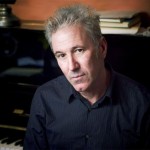 Find David Benjamin Steinberg @
Find David Benjamin Steinberg @
Official website
Soundcloud
Brief list of credits
Mapplethorpe: Look at the Pictures, Million Dollar Listing, THE LAST BEEKEEPER, Wishful Drinking
Tell us a little bit about yourself and how did you get your start as a composer?
I started writing music for corporate films, Intel, Porsche, Microsoft…stuff like that. Then I got into writing music for TV advertising
When did you get involved with a TV documentary Wishful Drinking and what was the brief like?
Carrie Fisher had a successful off Broadway one-woman show and HBO wanted to do
a documentary on it. The filmed version was pretty different from the live version, so I was hired to score it. The ‘brief” was just to support the new visual material. Carrie’s a really good singer and I worked with her in the studio too, and we recorded a couple of songs for the film. She was really fun to work with.
Are there any anecdotes while working on Imagine Films’ “Inside Deep Throat” (2005 doc that examined the social legacy of the infamous 70’s film) that you could share with us?
I remember having lengthy discussions with the directors about what the tone of the music might be to accompany footage of Linda performing her famous sex act. I must have written a half dozen cues for that scene before they approved the one that was ultimately included in the film.
What would you say would be the biggest difference between writing for a documentary and TV series?
I just completed an HBO doc about Robert Mapplethorpe. There’s over an hour and a half of music in it, so lots of the cues are really long. Typically the cues are relatively short on my TV shows. The doc writing tends to be more nuanced, too. I do a lot of Reality TV and often music is not written to picture, unlike the docs.
Based on your IMDB, you also had other jobs than composer. Could you share with us on your time as sound designer, re-recording mixer and sound supervisor? Where did you have most fun?
I started doing sound design and audio mixing when I didn’t have many jobs as a composer. I still love doing sound design and usually contribute sound design for most of the documentaries that I do. I’m often at the final mixes on my shows and having worked myself cleaning up dialogue and mixing, is good experience in helping to review a final mix with the directors.
You have also done quite a lot of music for advertising (Nokia, Honda, Mazda, etc.). How did you get involved in music for advertising and what is the most difficult part of composing for advertisement?
I had a chance to do some demos for a couple of spots for a small agency. I got the gigs and when the creative director that I worked for there moved to a larger agency, Chiat\Day, he brought me along. I worked for them for many years and they kept me very busy working for their offices around the country. Mattel has been a long time client and I still do music for toy spots through my company Rabbit Ears Music. The quick turnaround with advertising is demanding, particularly when a call comes overlapping an already in-progress project. I’m often trying to interpret the client’s and the production company’s input, which can sometimes be contradictory.
This one is for the gear heads. What tools and technology are you currently using and why?
I’ve used Logic Pro for many years. Currently, it’s running on a 2.4 Ghz Quad-Core MacPro with 32 GB of RAM. I love the Universal Audio Satellite Quad plugins and Waves plugins. I’ve been playing around a lot with automating filters on my cues, lately using the Waves OneKnob Filter. I have a second computer running Vienna Ensemble when I do orchestral sampling. I have lots of sample and loop libraries of course. When I am lucky enough to have the budget, I will record live players at my studio and pick from a small selection of my microphones, which includes the Neumann U87, a pair of Neumann KM184s and the Avantone CV-12. I mix on the Focal Twin6 Be monitors and often reference my mixes on the classic NS-10s. Pro Tools is big around my place for audio editing. Often while I am sequencing and recording, my assistant is cutting music into the show in my Pro Tools room. It’s not unusual on the documentaries to never get a locked cut, so music editing, as opposed to editing MIDI and re-sequencing in Logic, saves a lot of time.
Are there any tools you simply can’t work without? If so, what are they and why?
Logic, Pro Tools, and my assistant! He is archiving and tagging and sending track and video links to clients to review while I am writing. Keeping track of deliverables while multiple projects are going on simultaneously takes a lot of time. Some sample libraries I can’t live without include all the Spectrasonics products, LA Scoring Strings and Symphobia. I run most of my sample libraries through Kontakt.
Any hints, tips or motivational speeches for the readers?
Try to take risks with the work and don’t over think the money. Some things are going to pay well, others not so much. Think of the projects that pay well as subsidizing those you do for love. I personally don’t judge high and low brow projects. If I’m doing good work, it doesn’t matter whether it’s Reality TV, advertising, docs, short films or features. I just try to make the music as good as possible.
https://soundcloud.com/david-benjamin-steinberg/sets/filmtvscore
